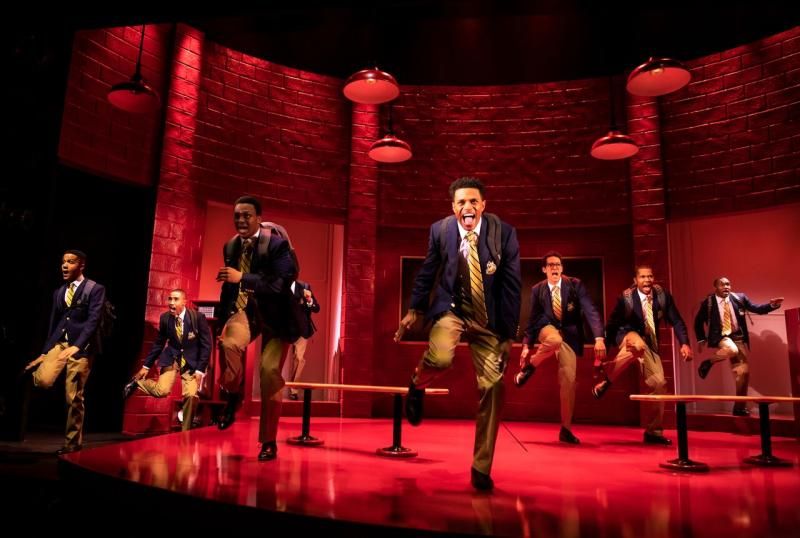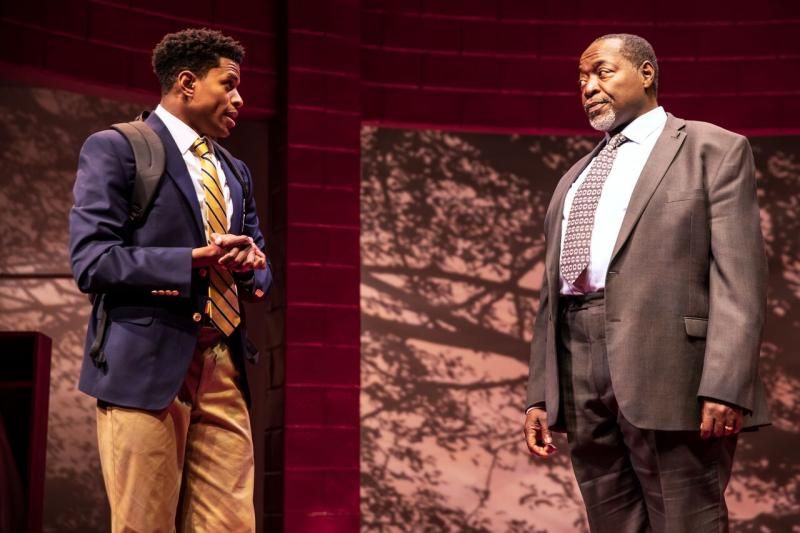Review: Tarell Alvin McCraney's Coming-Of-Age Drama CHOIR BOY Sings Out Spiritual Nourishment
"When I was little, my grandmother would sing songs to me that she told me freed slaves," says Pharus Jonathan Young, the central character of Tarell Alvin McCraney's emotionally thick coming-of-age drama, CHOIR BOY.

Jeremy Pope, Caleb Eberhardt, John Clay III and
Gerald Caesar (Photo: Matthew Murphy)
"Not physically but spiritually," he explains. "She said 'sangin' these songs... let them know God was with them everywhere they went, gave them strength and spiritual nourishment. Thus we call them Negro Spirituals."
Pharus (excellent work by the charismatic Jeremy Pope), has been given the honor of leading the choir during his senior year at the Charles R. Drew Prep School for Boys, a fictional institution educating young African American men. What he doesn't have is the honor of living openly as a gay teenager.
"You gotta tighten up so that people don't assume too much," scolds Headmaster Morrow (warm and authoritative Chuck Cooper), reacting to the limp-wristed manner in which his student casually carries himself.
As the play begins, Pharus is targeted with whispered racial and homophobic slurs by a classmate as he leads the choir in the school's anthem, "Trust and Obey." The school code against snitching prevents him from revealing that the culprit was the headmaster's nephew, Bobby (J. Quinton Johnson).
Pharus' senior year is also the school's 50th Anniversary, so it's of special concern to the headmaster that the choir's sponsor has taken maternity leave. With no one immediately available to fill the gap, Pharus is determined to shine by taking on all leadership responsibilities, increasing the friction between him and Bobby, which causes distress among the remaining choir member, including the sensitive athlete Anthony (John Clay III), aspiring pastor David (Caleb Eberhardt) and jokester Junior (Nicholas L. Ashe).

(Photo: Matthew Murphy)
But when joined by ensemble members Daniel Bellomy, Jonathan Burke, Gerald Caesar and Marcus Gladney they sound thrilling, performing Jason Michael Webb's arrangements of the choir's songbook, accented by muscular movements choreographed by Camille A. Brown. It's these musical moments that supply the characters they play with their own strength and spiritual nourishment.
Eventually, Headmaster Morrow is able to recruit the services of retired professor Mr. Pendleton, coincidentally played by New York stage mainstay (not to mention beloved acting teacher) Austin Pendleton, to sponsor the choir. Initially, the students don't know what to make of this rumpled old white man who apologizes for his lateness with a race-based joke, but Morrow defends his colleague's place in their institution with words that Pendleton would be too selfless to express.
While the play takes place in contemporary times, McCraney and director Trip Cullman's warmly affectionate tone gives it the kind of nostalgic feel that's familiar to the genre. And the issues that arise in the piece do have a touch of familiarity. What isn't familiar, though, is placing a young gay man of color - one who feels he has nothing to hide - at the center of it all, considerably raising the significance of placing a play like Choir Boy in front of Broadway audiences.
Reader Reviews
Powered by
|
Videos

